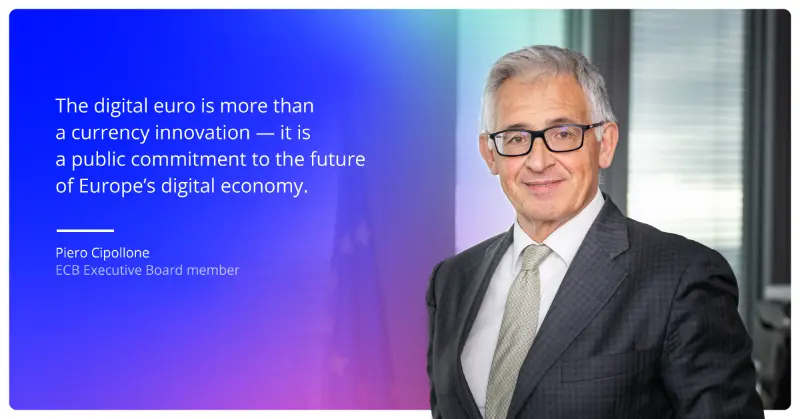
Piero Cipollone’s powerful address in Slovenia reignited Europe’s digital currency ambitions.
Sovereign Money in a Digital Age: Cipollone’s Vision for Europe
Digital Euro Awakens – In his speech at Banka Slovenije on July 10, 2025, Piero Cipollone, Member of the Executive Board of the European Central Bank (ECB), laid out a compelling case for the digital euro, a central bank-issued digital currency designed to complement cash, not replace it.
Cipollone stressed that the digital euro would serve as a legal tender, accessible to all Europeans for day-to-day digital transactions, while preserving the freedom to pay with sovereign money. He clarified:
“Cash serves us well… but it cannot be used for online payments. We must extend its benefits to the digital sphere.”
The digital euro would be free for basic use, privacy-protecting, and universally accepted across the euro area. It aims to counter the growing dominance of non-European payment providers, which currently process two-thirds of card-based transactions in the region.
Cipollone warned that Europe’s reliance on foreign systems could be weaponized in times of geopolitical tension. The digital euro, he argued, is not just a payment tool it’s a strategic shield for Europe’s autonomy.
Breaking Dependencies: The Case for Monetary Sovereignty
Cipollone’s speech highlighted three major challenges in Europe’s payment landscape:
- Dependence on non-European providers: Thirteen euro area countries rely entirely on international card schemes. This exposes Europe to external decisions that could disrupt daily transactions.
- Fragmentation of the payments market: Despite infrastructure like SEPA Instant and TIPS, Europe lacks a pan-European digital payment solution. National schemes remain siloed, limiting scalability and competitiveness.
- Poor user experience: Consumers juggle multiple apps and platforms, while merchants face high fees and limited interoperability. Cipollone cited Slovenia’s Flik system as promising but constrained by its domestic reach.
The digital euro would address these issues by offering a unified, sovereign, and inclusive digital payment option. It would empower European payment service providers to scale across borders, retain customer relationships, and reduce reliance on stablecoins and foreign digital wallets like PayPal and Apple Pay.
Cipollone emphasized that the ECB’s role is to enable this transition, not dominate it. The digital euro would be a public-private partnership, allowing banks and fintechs to innovate atop a secure, sovereign infrastructure.
Privacy, Resilience, and Innovation: What the Digital Euro Promises
One of the most striking aspects of Cipollone’s speech was his commitment to privacy. He assured that the digital euro would be designed to protect user data, unlike many commercial payment solutions that monetize personal information.
The digital euro would also support offline payments, ensuring resilience during cyberattacks or network failures. This feature mirrors the reliability of cash, offering a fallback in emergencies.
From an innovation standpoint, the digital euro would:
- Enable seamless cross-border payments within the euro area
- Reduce merchant fees, saving billions annually
- Support financial inclusion, especially for those underserved by traditional banking
- Strengthen Europe’s position in the global digital economy
Cipollone urged swift legislative action, warning that inaction could lead to loss of control over Europe’s financial infrastructure. He concluded:
“European citizens are relying on us to secure Europe’s chance to drive change rather than watch from the sidelines.”
Conclusion:
The digital euro is no longer a distant concept, it’s a strategic imperative. Piero Cipollone’s speech at Banka Slovenije was a clarion call for Europe to reclaim its monetary sovereignty, protect its citizens’ privacy, and lead the digital transformation of payments. As legislation nears and technical preparations advance, the digital euro could soon become the cornerstone of a resilient, inclusive, and autonomous European economy.
Stay updated with the latest news on Rapido Updates. Keep yourself updated with The World, India News, Entertainment, Market, Automobile, Gadgets, Sports, and many more